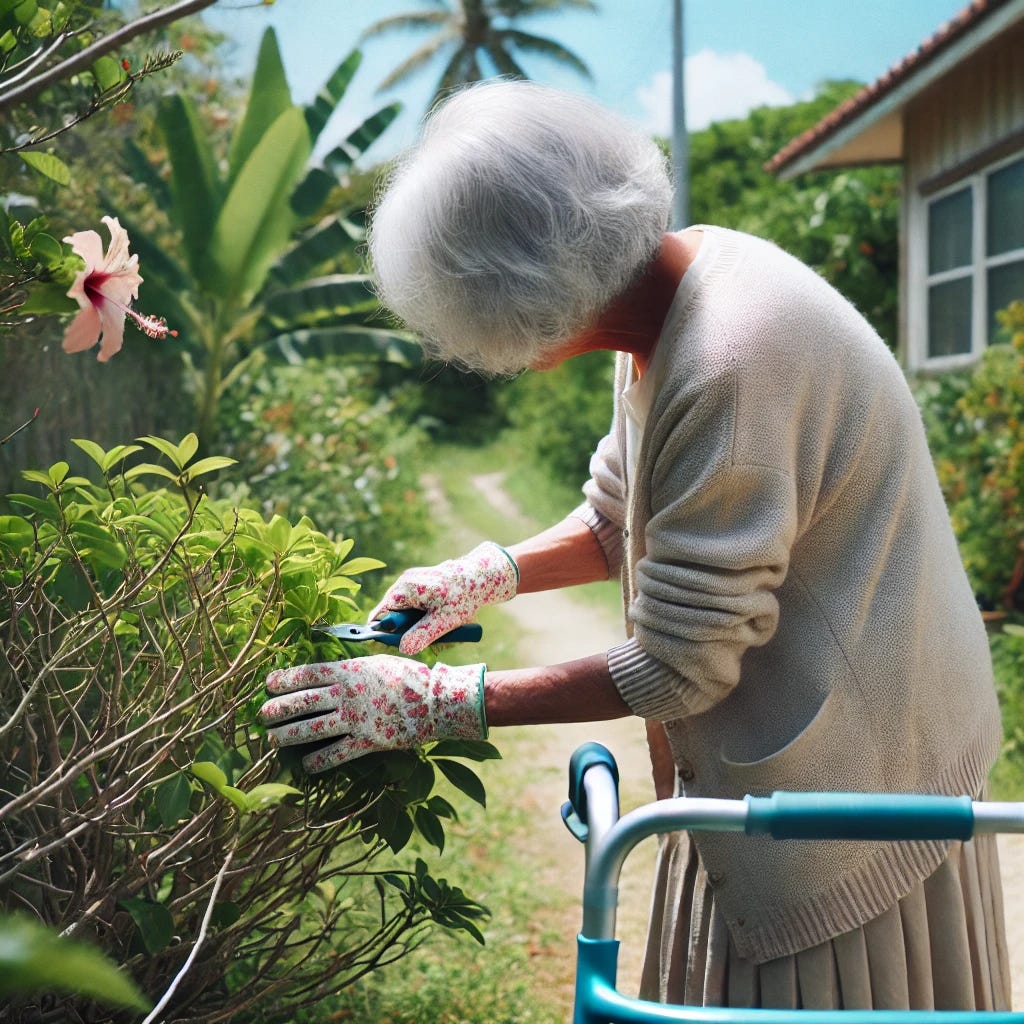Okinawa's Lessons on Living to 100
A centenarian hot spot where gardening is a common form of exercise, enjoyment and stress release.
Welcome to a newsletter themed at the intersection of longevity and wine history. 🍷
Not too long ago, Grandma Kay’s gardening habits troubled me. The problem was she had a tendency to get lost in her pruning, and before she knew it, her walker was 20 feet away. Visions of her tumbling over into a pile of weeds were often on my mind. In addition, she sometimes would forget to wear her medical alert button.
At the time, she was 99 and still maintained a bit of independence during the COVID lockdown of 2020. She slept in her Santa Clara Valley home alone, ate breakfast and did her morning exercises alone. In the early afternoon, when she was perhaps energized enough to get into real mischief, my mom or I would arrive as her supervising “caregiver.”
On days she felt a bounce in her step, she’d tinker in her garden for an hour before one of us arrived.
Gardening is an activity that brings her joy. (She’s now 103. Still tinkers in her garden on occasion, but with the watchful eye of professional caregivers around the clock.) Perhaps being in her garden brings her closer to her late husband. Grandpa Mario, who passed away 18 years ago, was a passionate gardener when not running his winery.
Gardening happens to be one of the common activities among centenarians in the longevity hotspot of Okinawa, a group of Japanese islands nearly 1,000 miles southwest of Tokyo. It’s known as one of the world’s 6 Blue Zones,1 popularized in longevity researcher Dan Buettner’s book, “The Blue Zones: Lessons For Living Longer From the People Who’ve Lived the Longest.”
Buettner notes that gardening has longevity benefits, because it’s a source of daily physical activity that exercises the body with a wide range of motions.
"Gardening is the epitome of a Blue Zone activity because it's sort of a nudge: You plant the seeds and you're going to be nudged in the next three to four months to water it, weed it, harvest it,” Buettner says.
"Gardening is the epitome of a Blue Zone activity because it's sort of a nudge: You plant the seeds and you're going to be nudged in the next three to four months to water it, weed it, harvest it,” Buettner says.
Buettner and his research team have declared the following longevity epicenters as blue zones: Okinawa, Nicoya (Costa Rica), Loma Linda (California, USA), Ikaria (Greece), Sardinia (Italy), and Singapore (the most recent addition).
The book explores the food, habits and lifestyles that contribute to the blue zones of the world. In the U.S., centenarians represent one per 5,000 people. By contrast, Okinawa’s centenarians are more than triple that number.
Many of the Okinawan centenarians eat vegetables and herbs from their gardens. They also turn to their garden for medicinal purposes. Mugwort, ginger, and turmeric are all staples of an Okinawan garden, with medicinal qualities. By consuming these every day, Okinawans may be protecting themselves against illness, Buettner writes.
Here are five other common lifestyle traits among centenarians in Okinawa, from “The Blue Zone.”
5 Common Lifestyle Traits
Here are five other common lifestyle traits among centenarians in Okinawa, from “The Blue Zones.”
1. Have a Purpose (ikigai)
Older Okinawans can readily articulate the reason they get up in the morning. Their purpose-imbued lives gives them clear roles of responsibility and feelings of being needed well into their 100s.
2. Eat a Plant-Based Diet (mostly)
Plant foods make up 90 percent of the traditional Okinawan diet. Less than 1 percent of the diet was fish; less than 1 percent was meat; and less than 1 percent was dairy and eggs.
3. Remain Active
Older Okinawans are active walkers and gardeners. The Okinawan household has very little furniture; residents take meals and relax sitting on tatami mats on the floor.
4. Have an Attitude
A hardship-tempered attitude has endowed Okinawans with an affable smugness. They’re able to let difficult early years remain in the past while they enjoy today’s simple pleasures.
5. Maintain a Moai
The Okinawan tradition of forming a moai provides secure social networks. These safety nets lend financial and emotional support in times of need and give all of their members the stress-shedding security of knowing that there is always someone there for them.
If you’re new here—hi, I’m Kevin!
I’m the author of 🍷 Rain on the Monte Bello Ridge,🍷 my forthcoming memoir about health, aging and winemaking. (Read the origin story of the book.) 🍇
The Centenarian Playbook is my newsletter, which features:
Healthy aging/longevity tips and stories from Grandma Kay’s long life.
Wine history & stories of the Gemello Winery
Ancestry & family research tips
There are three buttons at the bottom of every post: “like,” “comment,” and “restack.” Restacking is sharing in digital form. It goes out to the Substack community. If you enjoy the content and click “Restack,” it helps a lot.
Singapore was added as the sixth Blue Zone, years after the book was published.






Kevin,
Amother well written article. You are the very best and your book will read by me very soon YES? Take care, Phil
Another inspiring article. May we all live to a happy and healthy 100!